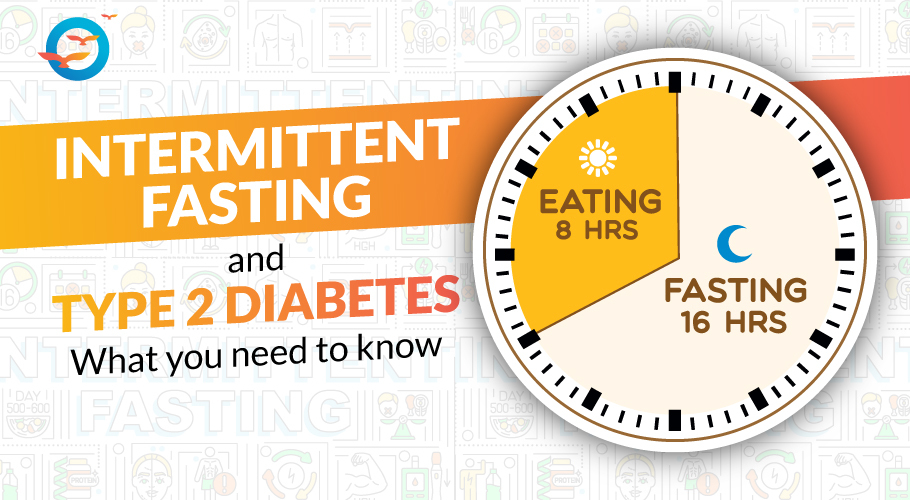Intermittent fasting for type-2 diabetes : benefits and risks

Intermittent fasting (IF) has gained popularity in recent years as a potential strategy for weight loss and improving overall health. For individuals with type 2 diabetes, IF may offer additional benefits, but it also comes with certain risks.
In this blog post, we'll delve into the effects of intermittent fasting on type 2 diabetes, examining both its advantages and potential drawbacks.
What is intermittent fasting?
Intermittent fasting is an eating pattern that cycles between periods of fasting and eating. There are several different methods of intermittent fasting, including;
- 16:8 Method: Fasting for 16 hours and eating within an 8-hour window.
- 12:12 Method: Fasting for 12 hours and eating within an 12-hour window.
- 15:9 Method: Fasting for 15 hours an eating within 9-hour window.
- 5:2 diet Method: Eating normally for five days a week and restricting calories for two days.
- Alternate-day fasting: Alternating between days of normal eating and days of fasting.
Benefits of Intermittent Fasting for Type 2 Diabetes:
- Weight Loss:
Intermittent fasting has gained popularity as a weight loss strategy due to its effectiveness and simplicity. By cycling between periods of eating and fasting, intermittent fasting can help reduce calorie intake and promote weight loss.
This approach can help control hunger and reduce overall calorie intake, leading to weight loss over time. Additionally, intermittent fasting may help boost metabolism and promote fat burning, further supporting weight loss efforts.
- Improved Insulin Sensitivity:
One of the key ways intermittent fasting impacts insulin is by improving insulin sensitivity. Insulin sensitivity refers to how effectively the body responds to insulin. When cells become resistant to insulin, they cannot effectively take up glucose from the bloodstream, leading to high blood sugar levels.
Intermittent fasting has been shown to increase insulin sensitivity, allowing cells to better respond to insulin and regulate blood sugar levels more efficiently.
Intermittent fasting also helps regulate insulin levels by reducing overall insulin secretion. When you fast, especially for extended periods, insulin levels in the blood drop significantly. This can help prevent chronically high insulin levels, which are associated with insulin resistance, weight gain, and various metabolic disorders.
- Reduced Inflammation:
Intermittent fasting has shown promising effects on reducing inflammation in the body. Inflammation is a natural immune response, but chronic inflammation is linked to various health issues, including heart disease, cancer, and diabetes.
Studies suggest that intermittent fasting can help reduce markers of inflammation, such as C-reactive protein (CRP) and interleukin-6 (IL-6). Fasting may trigger cellular autophagy, a process that removes damaged cells and reduces inflammation.
Additionally, fasting can lead to changes in gut bacteria, which play a role in inflammation. However, more research is needed to fully understand the effects of intermittent fasting on inflammation and how it can be used as a therapeutic approach for inflammatory conditions.
Risk and Considerations:
1. Hypoglycemia:
People with diabetes who take insulin or certain medications that can cause low blood sugar levels (hypoglycemia) need to be cautious with fasting, as it can increase the risk of hypoglycemia.
2. Nutrient Deficiencies:
IF may lead to inadequate nutrient intake if not followed carefully, which can be a concern for individuals with diabetes who already have specific dietary requirements.
3. Impact on Medication:
IF can affect the timing and effectiveness of diabetes medications, so it's essential to consult with a healthcare provider before starting any fasting regimen.
Tips for Safe Intermittent Fasting with Type 2 Diabetes:
1. Consult with a Healthcare Provider:
Before starting intermittent fasting, talk to your healthcare provider or a registered dietitian to ensure it's safe for you.
2. Monitor Blood Sugar Levels:
Keep a close eye on your blood sugar levels while fasting and adjust your medications or insulin doses as needed.
3. Stay Hydrated:
Drink plenty of water during fasting periods to stay hydrated.
4. Focus on Nutrient-Dense Foods:
When you do eat, choose nutrient-dense foods to ensure you're getting essential vitamins and minerals.
Important Note:
After experimenting with different fasting windows, it's important to settle on one that suits your lifestyle and health goals. Consistency is key in reaping the benefits of intermittent fasting, such as improved insulin sensitivity and weight management. Settling on a fasting window helps regulate your body's internal clock, making it easier to stick to your fasting routine. Listen to your body's cues and adjust your fasting window if needed, ensuring it remains sustainable in the long term. Consulting with a healthcare provider can also provide guidance in finding the right fasting window for you.
Conclusion:
Intermittent fasting can offer benefits for individuals with type 2 diabetes, such as weight loss and improved insulin sensitivity. However, it also carries risks, including hypoglycemia and nutrient deficiencies. It's important to approach intermittent fasting with caution and under the guidance of a healthcare professional to ensure it's safe and effective for you.
At Freedom from Diabetes, we recommend intermittent fasting after assessing the patient's reversal level to determine eligibility. We provide close guidance and monitoring to our participants who choose to undertake intermittent fasting.
Additionally, we offer valuable tips to be followed during intermittent fasting and emphasize the importance of staying replenished during this time. Many of our participants have experienced healing and achieved remarkable weight loss, reductions in insulin resistance, inflammation, and overall improvement in health through intermittent fasting.
Diabetics, go ahead with intermittent fasting and lay the foundation for a healthy body!

